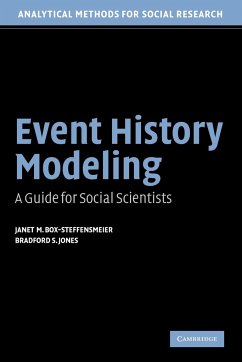Here is an accessible, up-to-date guide to event history analysis for researchers and advanced students in the social sciences. The foundational principles of event history analysis are discussed and ample examples are estimated and interpreted using standard statistical packages, such as STATA and S-Plus. Recent and critical innovations in diagnostics are discussed, including testing the proportional hazards assumption, identifying outliers, and assessing model fit. The treatment of complicated events includes coverage of unobserved heterogeneity, repeated events, and competing risks models. The authors point out common problems in the analysis of time-to-event data in the social sciences and make recommendations regarding the implementation of duration modeling methods.
Bitte wählen Sie Ihr Anliegen aus.
Rechnungen
Retourenschein anfordern
Bestellstatus
Storno


